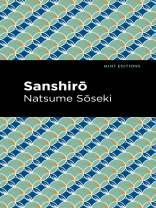Sanshirō (1908) is a novel by Natsume Sōseki. Inspired by the author’s experience as a student from the countryside who moved to Tokyo, Sanshirō is a story of family, growth, and identity that captures the isolation and humor of adjusting to life on one’s own. Recognized as a powerful story by generations of readers, Sanshirō is a classic novel from one of Japan’s most successful twentieth century writers.
Raised on the island of Kyushu, Sanshirō Ogawa excels in high school and earns the chance to continue his studies at the University of Tokyo. On his way there, he naively accepts an invitation to share a room with a young woman in Nagoya, realizing only too late that she has other things than sleep in mind. As he adjusts to life in the big city, he finds himself stumbling into more uncomfortable situations with women, radical political figures, and interfering colleagues, all of which shape his sense of identity while teaching him the value of trust, courage, and self-respect. While he misses his family and friends in Kyushu, Sanshirō learns to value his newfound independence, forming friendships that will last a lifetime. Sanshirō proves a gifted student but struggles to understand the intricacies of academic life. As he begins a relationship with the lovely Mineko, he begins to doubt his ability to defy tradition. Will he return home to raise a family in Kyushu, or remain in Tokyo to chart a path of his own? Eminently human, Sanshirō is a beloved story of isolation, morality, and conflict from a master of Japanese fiction.
This edition of Natsume Sōseki’s Sanshirō is a classic work of Japanese literature reimagined for modern readers.
Since our inception in 2020, Mint Editions has kept sustainability and innovation at the forefront of our mission. Each and every Mint Edition title gets a fresh, professionally typeset manuscript and a dazzling new cover, all while maintaining the integrity of the original book.
With thousands of titles in our collection, we aim to spotlight diverse public domain works to help them find modern audiences. Mint Editions celebrates a breadth of literary works, curated from both canonical and overlooked classics from writers around the globe.
Про автора
Natsume Sōseki (1867-1916) was a Japanese novelist. Born in Babashita, a town in the Edo region of Ushigome, Sōseki was the youngest of six children. Due to financial hardship, he was adopted by a childless couple who raised him from 1868 until their divorce eight years later, at which point Sōseki returned to his biological family. Educated in Tokyo, he took an interest in literature and went on to study English and Chinese Classics while at the Tokyo Imperial University. He started his career as a poet, publishing haiku with the help of his friend and fellow-writer Masaoka Shiki. In 1895, he found work as a teacher at a middle school in Shikoku, which would serve as inspiration for his popular novel Botchan (1906). In 1900, Sōseki was sent by the Japanese government to study at University College London. Later described as “the most unpleasant years in [his] life, ” Sōseki’s time in London introduced him to British culture and earned him a position as a professor of English literature back in Tokyo. Recognized for such novels as Sanshirō (1908) and Kokoro (1914), Sōseki was a visionary artist whose deep commitment to the life of humanity has earned him praise from such figures as Haruki Murakami, who named Sōseki as his favorite writer.












